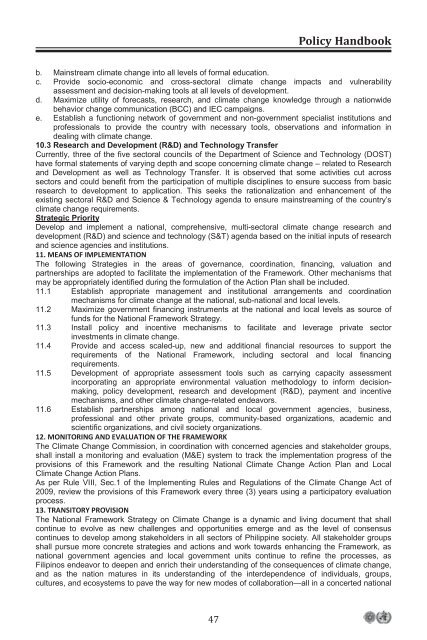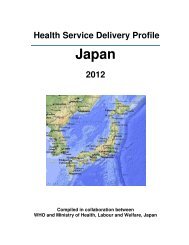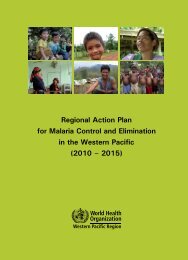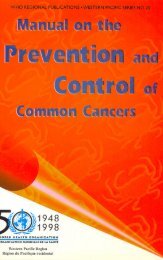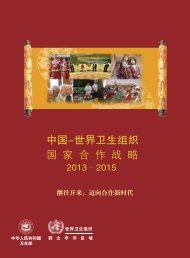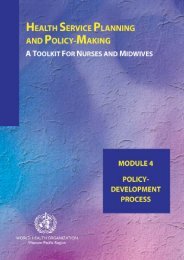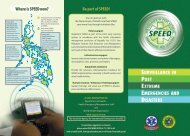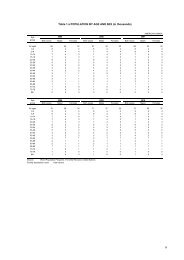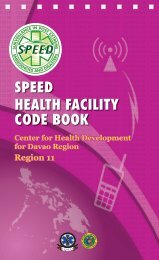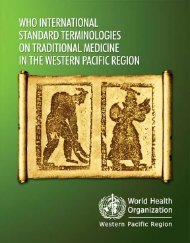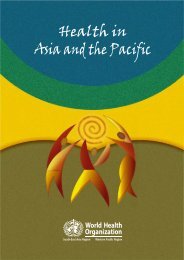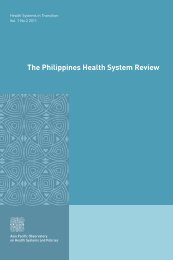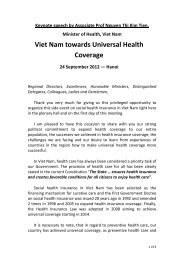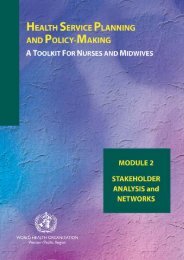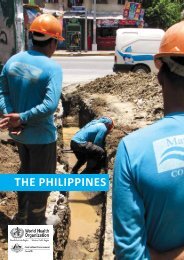Untitled - DOH
Untitled - DOH
Untitled - DOH
- No tags were found...
Create successful ePaper yourself
Turn your PDF publications into a flip-book with our unique Google optimized e-Paper software.
National Framework Strategy on Climate Change Policy 2010-2022 Handbookb. Mainstream climate change into all levels of formal education.c. Provide socio-economic and cross-sectoral climate change impacts and vulnerabilityassessment and decision-making tools at all levels of development.d. Maximize utility of forecasts, research, and climate change knowledge through a nationwidebehavior change communication (BCC) and IEC campaigns.e. Establish a functioning network of government and non-government specialist institutions andprofessionals to provide the country with necessary tools, observations and information indealing with climate change.10.3 Research and Development (R&D) and Technology TransferCurrently, three of the five sectoral councils of the Department of Science and Technology (DOST)have formal statements of varying depth and scope concerning climate change – related to Researchand Development as well as Technology Transfer. It is observed that some activities cut acrosssectors and could benefit from the participation of multiple disciplines to ensure success from basicresearch to development to application. This seeks the rationalization and enhancement of theexisting sectoral R&D and Science & Technology agenda to ensure mainstreaming of the country’sclimate change requirements.Strategic PriorityDevelop and implement a national, comprehensive, multi-sectoral climate change research anddevelopment (R&D) and science and technology (S&T) agenda based on the initial inputs of researchand science agencies and institutions.11. MEANS OF IMPLEMENTATIONThe following Strategies in the areas of governance, coordination, financing, valuation andpartnerships are adopted to facilitate the implementation of the Framework. Other mechanisms thatmay be appropriately identified during the formulation of the Action Plan shall be included.11.1 Establish appropriate management and institutional arrangements and coordinationmechanisms for climate change at the national, sub-national and local levels.11.2 Maximize government financing instruments at the national and local levels as source offunds for the National Framework Strategy.11.3 Install policy and incentive mechanisms to facilitate and leverage private sectorinvestments in climate change.11.4 Provide and access scaled-up, new and additional financial resources to support therequirements of the National Framework, including sectoral and local financingrequirements.11.5 Development of appropriate assessment tools such as carrying capacity assessmentincorporating an appropriate environmental valuation methodology to inform decisionmaking,policy development, research and development (R&D), payment and incentivemechanisms, and other climate change-related endeavors.11.6 Establish partnerships among national and local government agencies, business,professional and other private groups, community-based organizations, academic andscientific organizations, and civil society organizations.12. MONITORING AND EVALUATION OF THE FRAMEWORKThe Climate Change Commission, in coordination with concerned agencies and stakeholder groups,shall install a monitoring and evaluation (M&E) system to track the implementation progress of theprovisions of this Framework and the resulting National Climate Change Action Plan and LocalClimate Change Action Plans.As per Rule VIII, Sec.1 of the Implementing Rules and Regulations of the Climate Change Act of2009, review the provisions of this Framework every three (3) years using a participatory evaluationprocess.13. TRANSITORY PROVISIONThe National Framework Strategy on Climate Change is a dynamic and living document that shallcontinue to evolve as new challenges and opportunities emerge and as the level of consensuscontinues to develop among stakeholders in all sectors of Philippine society. All stakeholder groupsshall pursue more concrete strategies and actions and work towards enhancing the Framework, asnational government agencies and local government units continue to refine the processes, asFilipinos endeavor to deepen and enrich their understanding of the consequences of climate change,and as the nation matures in its understanding of the interdependence of individuals, groups,cultures, and ecosystems to pave the way for new modes of collaboration—all in a concerted national4747


